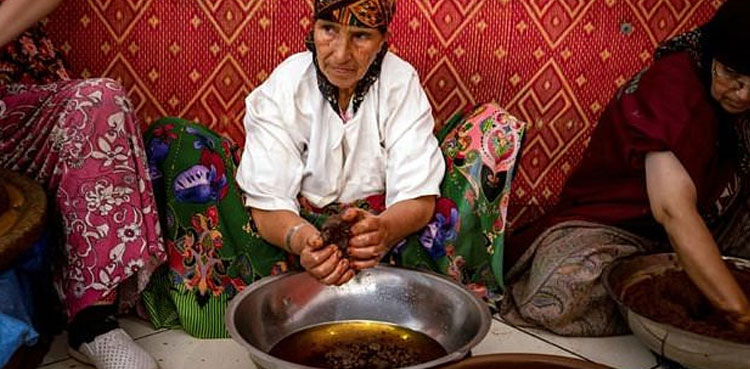
Morocco’s argan oil is highly prized by the cosmetics industry, yet it is now mostly produced by elderly workers, raising questions about how long the artisanal practice can continue.
A dozen women, sitting on the floor of a workshop inland from Essaouira, a port town on Morocco’s Atlantic coast, work to deftly shell argan nuts, crush them and extract the oil.
It is a time-honoured and labour-intensive craft, but one increasingly shunned by young people in the North African kingdom.
The women, mostly aged over 60, manually pulp the small yellow fruits at Cooperative Marjana, while others use hammers to crush the robust shells and remove the nuts.
The fruits are then sorted, roasted, ground and pressed for their oil, which is used in cooking but has also long been famed for its moisturising and anti-ageing properties for skin and hair.
“It’s difficult work and it requires experience and, most of all, patience,” said Samira Chari, who at 42 is Marjana’s youngest artisanal worker.
Cooperative founder Amel El Hantatti says the job’s physical nature is one reason “young people aren’t taking up this craft anymore”, despite a lack of local employment.
The area’s otherwise arid landscape is home to vast argan orchards. Tourists stopping to see the production process and buy argan products are warmly welcomed by Marjana’s all-female staff.
Argan is so important to the region between the towns of Essaouira and Agadir that in 1998 UNESCO declared a biosphere reserve in the area and later added the tree’s cultivation to its Intangible Cultural Heritage list.
Most of the women at Cooperative Marjana are older than 60
Argan oil is the main source of revenue in this part of southern Morocco, where few other crops survive the low rainfall and searing summer heat.
It is also widely used in Moroccan cuisine and has been certified with an Appellation of Origin since 2010.
Hantatti founded the cooperative in 2005 and says it now employs 80 women, some working in production and others in sales.
But today, she says, “I really fear that the artisanal production of argan oil might disappear”.
‘A spiritual quality’
The cooperative’s younger workers prefer to work in the gift shop, selling argan soap, shampoo and moisturiser.
One of them, Assia Chaker, 25, said: “I tried to work a few days with the craftswomen but I couldn’t carry on, it’s a hard process and really tiring.
The cooperative’s founder says ‘oil extracted by machines will never have the same flavour as what the women produce’
“I like having contact with people and practising other languages with tourists who come into the shop every day, instead of spending the whole day crushing and pulping argan nuts.
“Anyway, one day the job will be done by machines,” she added.
But Hantatti said the process is hard to mechanise, insisting that “oil extracted by machines will never have the same flavour as what the women produce.
“It contains all the positive vibes of these artisans, their laughter, the stories they share as they’re working. There’s a spiritual quality that makes it special and unique.”
The cooperative produces up to 1,000 litres (about 265 gallons) of oil a year and works with tour companies bringing groups of visitors as they pass through the popular coastal region.
Morocco produces around 5,640 tonnes of argan oil annually, according to official figures, around 40 percent of it for export.
The sector’s turnover tripled between 2012 and 2019 to reach around $115 million, according to the agriculture ministry.
from International News Today - Breaking News, US News, World News https://ift.tt/PaANibR
